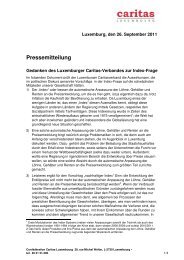Sozialalmanach - Caritas Luxembourg
Sozialalmanach - Caritas Luxembourg
Sozialalmanach - Caritas Luxembourg
You also want an ePaper? Increase the reach of your titles
YUMPU automatically turns print PDFs into web optimized ePapers that Google loves.
mortgage defaults and rising insolvencies, which will have an adverse feedback effect on the<br />
already weakened banking system, triggering another contraction in the financial sector.<br />
Second, there is the aftershock of a pension crisis. The sharp fall in equity markets<br />
has severely affected the value of pension fund assets, jeopardising pensioners’ incomes in<br />
countries with large private pension provisions. In many western economies – especially the<br />
US and the UK – public pensions have already been retrenched over the past two decades.<br />
Instead, people have been given incentives to choose their own private pension arrangements.<br />
Many have used real estate as investment for old age savings, feeding into the growth of<br />
the financial industry, which now has collapsed, bringing their savings down with it. For<br />
Europe, the dual challenges of the economic crisis, combined with the expenditure pressures<br />
of the ageing population, mark a real stress test for public and private pension funds.<br />
Third, there is the aftershock of a fiscal crisis of the state. Costly bank bailouts, tax<br />
cuts, and other stimulus measures have drained the public purse. In Europe, the automatic<br />
stabilisers of comprehensive social insurance could engender a double bind of rising social<br />
benefit expenditures combined with declining government revenues. Ageing population has<br />
already resulted in a shrinking work force, which significantly reduces tax revenues, even<br />
independently of the crisis. Under these conditions, an emerging economic recovery is not<br />
likely to lead to budget relief.<br />
Fourth, many experts believe we have to reckon with a protracted period of low growth.<br />
Neither indebted firms and consumers nor the public sector, and not to speak of the<br />
financial sector, are well placed to restore consumer demand and economic growth. The<br />
economic crisis of the late nineteenth century was left behind because of growth generated<br />
by electrification and industrialisation. Following the Second World War, a new middle<br />
class emerged, and growth was driven by durable consumer goods. The fallout from the<br />
crisis in the 1970s and 1980s was cushioned by growth generated by the ICT revolution.<br />
But where will the growth drivers come from? Once the recession subsides, elevated public<br />
debt-to-GDP ratios will make fiscal consolidation imperative. This will require tight fiscal<br />
control and painful cuts in national welfare programs. Most likely, taxes will have to be<br />
raised in the final stage of fiscal consolidation in order to pay down public debt even<br />
though this could negatively affect growth prospects and leave little room for addressing<br />
newly emerging social needs.<br />
Because of the likely aftershocks in the labour market, banking system, pension system,<br />
public finance, and production regimes, there is a real danger of the crisis persisting for<br />
more than just a few bad years. Japan’s “lost decade” following the crisis in the early 1990s<br />
provides a worrisome antecedent 2 . Nevertheless, according the OECD, we should count our<br />
2 Koo (2008).<br />
148








